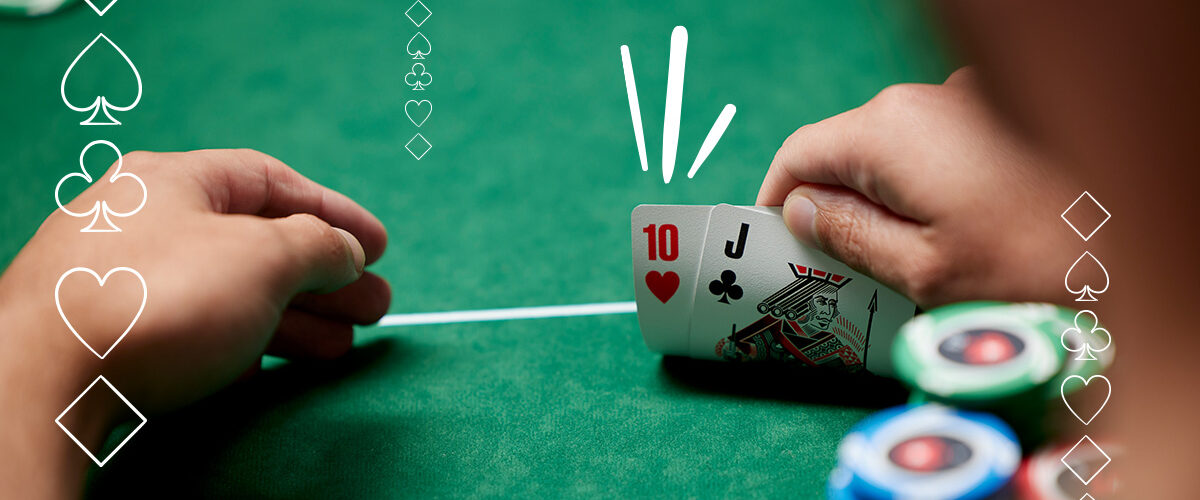The Early Stage – Preflop
The early stage of a tournament is very similar to a cash game. The stacks are still very big in relation to the blinds. The main difference to a cash game is that we normally can’t re-buy in a tournament. For this reason, in tournaments it’s much more important not to lose all of our chips in a single hand, because this would mean elimination from the tournament.

Playing style: tight is right
Many inexperienced players think that they can play even marginal hands in the early phase of a tournament as the blinds are still very low and they can see the flop cheaply. This way of thinking is wrong! In fact, the opposite is correct. There is little or no reason to play marginal hands, precisely because the blinds are still small in relation to the stacks. We play this phase extremely tightly, i.e. we only play our good hands, thus exploiting the loose style of our opponents.
When we are in early position at the table, we should look to play only premium hands such as JJ, QQ, KK, AA and AK. If we concentrate on these hands, we will often be able to knock one or two bad players out of the tournament, simply by virtue of having the better hand. In later positions we can also play smaller pairs and suited connectors such as 7♥ 6♥ .
A common mistake is playing cards that are easily dominated against raises from an early position. This occurs most often with hands such as AQ, KQ and AJ. These hands are weak when we are playing them against hands that are typically raised in early position (EP).
The tight game usually has two objectives:
- Enter the pot as favourites and win our opponents’ chips. Good starting hand selection makes our decisions in later rounds of betting considerably easier.
- Create a suitable image for the later phases of the tournament. Playing tight early on means, when the blinds are higher, we’ll have the image of a “rock” who plays only the really good hands, which will enable us to play a steal or a bluff.
There is one problem with this way of playing: when we are dealt good hands, we often get less action from our opponents. If a player continually folds and raises only once every twenty hands, even the most unobservant of opponents will become suspicious and fold the weak hands they would normally have resisted folding against other players.
Although this type of game is generally to be recommended, it does have a further disadvantage for good and very good players. They could make something out of weaker hands such as smaller pairs, (eg. 4♦ 4♣ ), or high Broadway cards (e.g.A♠ Q♠ ).
The optimum type of game thus includes playing a few hands – small Broadway hands and suited connectors – in late position that are not quite as strong but which nevertheless have potential.
Small Pairs
Pocket pairs from 22 to 99 can rake in a respectable number of chips as soon as they become a set. If we don’t hit a set, though, these hands are worth nothing. With cards like these we try to see the flop cheaply and hope for a set. “Cheaply” means that we either limp if we are in middle or late position or are one of the blinds, or that we even call a raise up to a maximum of a tenth of our stack if we are in late position. In early position we always fold because, out of position and preflop, small pairs are too weak to hold out against a possible raise.
High Pairs
Pocket pairs from TT to AA should always be raised preflop, not only because they can make us a lot of money, but also because they need to be protected by a raise so that our opponents aren’t able to improve their hands cheaply.
If players before or after us raise more than once then we can fold hands such as TT and JJ, and even if there is only a single raise after ours we should consider folding this hand and waiting for a better opportunity. However, this decision depends largely on the opponent.
Big Broadway cards
A-K and A-Q are also strong hands, similar to high pairs, and should correspondingly be played similarly preflop – AK like aces and kings, and AQ like a pair of tens, for example.
Small Broadway Cards
Small Broadway cards such as A-T, K-J, Q-T, J-T must be played with extreme caution in this phase of a tournament.
The first rule is: if the small Broadway cards are not suited, or if there has already been a raise, then fold! An exception would be the situation in which we are in late position with six players ahead of us who only paid the big blind or called a minimum raise: then, naturally, we could also play. The big problem with these hands is that they are often dominated by better hands.
For example, K♦ Jd] or K♣ Q♣ will seldom win against hands such as A♠ J♥ or A♣ Q♦ . With small Broadway hands we mainly want to hit monsters like straights or flushes, which is why it’s important to see the flop cheaply with these hands. If we only hit a weak pair or not at all then we can quickly fold.
Suited Connectors
Hands like 6♥ 7♥ , or even J♠ 9♠ , can be played similarly to small pairs. Obviously we are speculating on a flush or a straight here.
Other Starting Hands
All starting hands not listed above are folded without exception.
Stealing the Blinds
In the early phase of a tournament, the blinds are unimportant as they are very small in relation to our stack. In the early phase of a normal PokerStars tournament we have a stack of 1,500 chips and the blinds are 10/20. In other words, we have 75BBs, and winning the blinds increases our stack by only 2%. And this must be seen in conjunction with the risk of losing a lot of chips if we go wrong.
For this reason, we should pass up on stealing the blinds with weak and marginal hands in the early phase of a tournament. However, this does not mean that we shouldn’t attack the blinds when we have stronger hands such as pairs, aces with strong kickers and suited connectors.
Test your knowledge with our short quiz below


